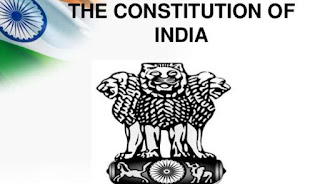The Writing of Our Indian Constitution :-
Just before we gained independence, the people elected a body called the Constituent Assembly, and gave in the task of discussing and deciding upon our Constitution. The Constituent Assembly them formed a committee was headed by Dr Bhimrao Ambedkar. It studied the constitutions of many countries and came up with one that would suit us. The Constitution prepared by the committee was discussed and approved by the Constituent Assembly. It finally became our Constitution on 26 January 1950. We say we adopted our Constitution on this day, which we call our Republic Day.
A Few Things About Our Constitution :-
Our Constitution is the longest written Constitution in the world. It explains the nature and functions of our government, what rights the people have, and so on. we can not discuss everything in it, but here a few important things.
Democratic republic India is a democratic republic. In a republic, the head of the country is a president, not a king or queen. In a democracy, the leaders elected by the people form the government. In our country, the leaders elected by the people become members of parliaments (MPs). The party with the majority (more than half) of MPs forms the government.
Indian union India is a union of many states. The Constitution says that each state will have its own government. And the whole of India, or the Indian union, will have the union government (Central Government). The Constitution specifies the jobs of the State Government and the union Government.Some of the things that the state governments look after are law and order (police), state transport, farming, health (health centres, hospitals, ans so on), and electric supply. The union government loks after things that are of importance to the whole country, such as defence (armed forces), railways, national highways and our relations with our countries.
Secular country Ours is a secular country. This means the government does not support any particular religion. All religions are equal in our country.
Liberty and equality Liberty (freedom) and equality are two basic ideas behind many things in our Constitution. On the basis of these, our Constitution gives us some rights. For example, we have the freedom to live do things in our own way. And all of us are treated equally by the government and the law.
Directive Principles A principle is the basic idea behind something. Our Constitution asks the government to act and made laws according to certain principles. The principles include ensuring the good of the people, setting up of pnchayats, protecting forest, wildlife etc. A lot of work has already been done. As you have learnt, panchayats are working in our villages. Laws have been made to help workers, woman, tribals and the backward casts. The government has decided o provide free education to children between the ages of 6 and 14.
All Constitution are not written. One example is the Constitution of the United Kingdom.


Comments
Post a Comment